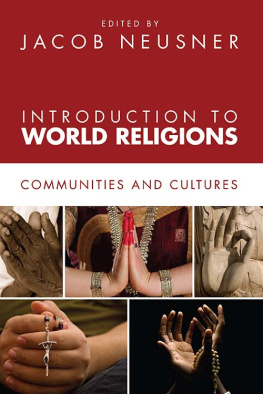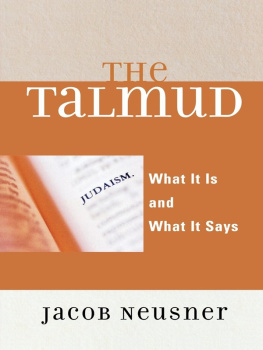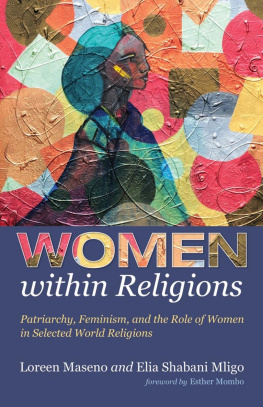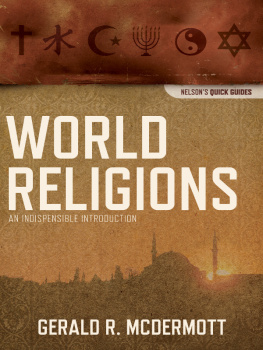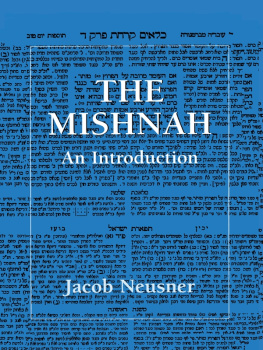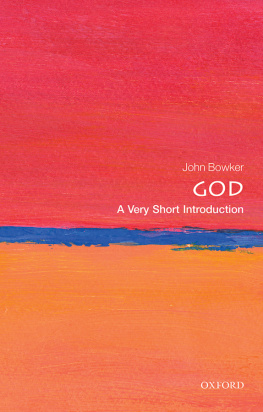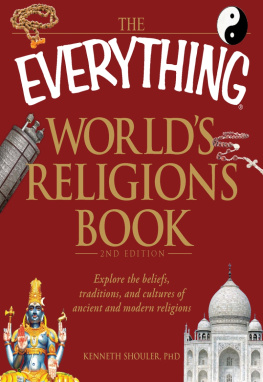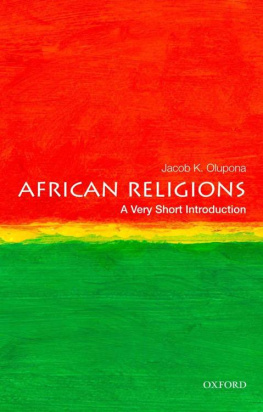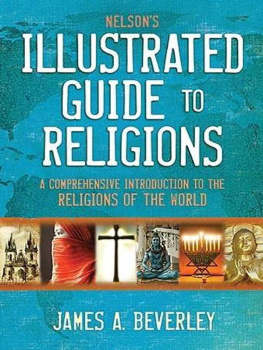Neusner - Introduction to World Religions: Communities and Cultures
Here you can read online Neusner - Introduction to World Religions: Communities and Cultures full text of the book (entire story) in english for free. Download pdf and epub, get meaning, cover and reviews about this ebook. City: Nashville;Tenn, year: 2010, publisher: United Methodist Publishing House;Abingdon Press, genre: Religion. Description of the work, (preface) as well as reviews are available. Best literature library LitArk.com created for fans of good reading and offers a wide selection of genres:
Romance novel
Science fiction
Adventure
Detective
Science
History
Home and family
Prose
Art
Politics
Computer
Non-fiction
Religion
Business
Children
Humor
Choose a favorite category and find really read worthwhile books. Enjoy immersion in the world of imagination, feel the emotions of the characters or learn something new for yourself, make an fascinating discovery.
Introduction to World Religions: Communities and Cultures: summary, description and annotation
We offer to read an annotation, description, summary or preface (depends on what the author of the book "Introduction to World Religions: Communities and Cultures" wrote himself). If you haven't found the necessary information about the book — write in the comments, we will try to find it.
Neusner: author's other books
Who wrote Introduction to World Religions: Communities and Cultures? Find out the surname, the name of the author of the book and a list of all author's works by series.
Introduction to World Religions: Communities and Cultures — read online for free the complete book (whole text) full work
Below is the text of the book, divided by pages. System saving the place of the last page read, allows you to conveniently read the book "Introduction to World Religions: Communities and Cultures" online for free, without having to search again every time where you left off. Put a bookmark, and you can go to the page where you finished reading at any time.
Font size:
Interval:
Bookmark:
INTRODUCTION TO
WORLD RELIGIONS
INTRODUCTION TO
WORLD RELIGIONS
COMMUNITIES AND CULTURES
EDITED BY
JACOB NEUSNER
ABINGDON PRESS
Nashville
INTRODUCTION TO WORLD RELIGIONS
COMMUNITIES AND CULTURES
Copyright 2010 by Abingdon Press
All rights reserved.
No part of this work may be reproduced or transmitted in any form or by any means, electronic or mechanical, including photocopying and recording, or by any information storage or retrieval system, except as may be expressly permitted by the 1976 Copyright Act or in writing from the publisher. Requests for permission should be addressed to Abingdon Press, P.O. Box 801, 201 Eighth Avenue South, Nashville, TN 37202-0801, or e-mailed to permissions@abingdonpress.com.
This book is printed on acid-free paper.
Library of Congress Cataloging-in-Publication Data
Introduction to world religions : communities and cultures / edited by Jacob Neusner.
p. cm.
Includes bibliographical references.
ISBN 978-0-687-66000-1 (pbk. : alk. paper)
1. Religions. I. Neusner, Jacob, 1932
BL80.3.I59 2010
200dc22
2009053600
All scripture quotations, unless noted otherwise, are taken from the New Revised Standard Version of the Bible, copyright 1989, Division of Christian Education of the National Council of the Churches of Christ in the United States of America. Used by permission. All rights reserved.
Scripture quotations marked NEB are taken from The New English Bible. The Delegates of the Oxford University Press and The Syndics of the Cambridge University Press 1961, 1970. Reprinted by permission.
Scripture quotations marked TANAKH are taken from TANAKH: The New JPS Translation According to the Traditional Hebrew Text. Copyright 1985 by the Jewish Publication Society. Used by permission.
10 11 12 13 14 15 16 17 18 1910 9 8 7 6 5 4 3 2 1
MANUFACTURED IN THE UNITED STATES OF AMERICA
A "Humanly Relevant" Cosmos: What We Study
When We Study Religion
William Scott Green
- Judaism
Baruch A. Levine
Jacob Neusner- Judaism in Modern Times: Reform, Orthodox, and
Conservative Judaism; Zionism
Jacob Neusner
- Christianity
Bruce Chilton
Lawrence S. Cunningham
J. A. McGuckin
Martin E. Marty
- Islam
Th. Emil Homerin
Liyakat Takim
Th. Emil Homerin
Douglas Brooks- Buddhism
Mario Poceski
Kristin Scheible
Mark L. Blum
Mark Meulenbeld
Mark A. Csikszentmihalyi
James L. Ford- Indigenous Religions
Jualynne E. Dodson and Sonya Maria Johnson
Jacob Olupona
Danny L. Jorgensen
Dell deChant
INTRODUCTION
A "HUMANLY RELEVANT" COSMOS: WHAT WE STUDY WHEN WE STUDY RELIGION
William Scott Green
R eligion is a powerful force in contemporary life. It both unites nations and divides peoples. It both teaches charity and generates suspicion. It both offers solace and causes anxiety. It provides hope and inspires fear. It promotes human rights and preserves social inequity. It advances social justice and obstructs social mobility. It calls for peace and causes war. It preaches love and breeds intolerance. Americans in particular think religion is a significant part of human experience. Because religion is so consequential, it also is controversial. Some see it as a destructive delusion, We study religion to make sense of all this to understand what religions advocate, what religious people do, why they do it, and why it matters. In doing so, we use disciplined investigation to find the rationalityor irrationalityin what religions teach and how their adherents behave. We will look at these issues in the rest of this introduction.
Why Religion Matters
Religion matters for two reasons. First, globally, religion is an increasingly important part of contemporary life. Second, religion is a basic element in American politics, society, and culture. Let us take these up in turn.
Contemporary research shows that in the past thirty or forty years, religion has grown significantly in the world's cultures. Consider the following data:
- "The world's largest religions have expanded at a rate that exceeds that of global population growth."
- "A greater proportion of the world's population adhered to each of" the religious systems of Catholicism, Protestantism, Islam, and Hinduism "in 2000 than in 1900."
- "The overwhelming preponderance of this growth occurred between... 1970 and 2000."
- More people in the world hold "traditional religious beliefs" than ever before.
- "Today religion is the most common source of civil wars currently raging.... Since 2000, fully 47 percent of civil wars have been religious."
- "Religious ideology is the leading motivator for most translational terrorist attacks, particularly but not exclusively those committed by al Qaeda."
- Religion's influence appears to increase with democracy and democratization.
- "Far from stamping out religion, modernization has spawned a new generation of say, organizationally sophisticated, and technologically adept religious movements."
- The new religious movements are "politically capable."
These data show the expanding influence of religion in the world's population and emphasize its impact on world politics. The correlation of religion's growth with the "economic and political modernization" of the past three or four decades suggests that religion will be significant in global life well into the future.
Why We Care about Religion
Even if religion were less important than it is in the contemporary world, it still would matter to Americans because the U.S. Constitution, in the First Amendment, mandates and privileges the category of religion. Indeed, religion may be the only field in the humanities whose subject matter is explicitly named and governed by the U.S. Constitution.
The First Amendment states: "Congress shall make no law respecting an establishment of religion, or prohibiting the free exercise thereof." It assumes that religion and government are different and distinct, and it sets religion apart as a particular kind or sphere of experience. In so doing, the First Amendment makes religion into a fundamental component of American life. Indeed, religion is so familiar in American discourse that it can be called a native category for Americans. It is something we inherit as an assumed part of our national and personal lives. This does not mean that all Americans practice religion, but rather that religion is a culturally legitimate marker both of Americans' individual and national identities. Americans routinely define themselves in terms of being either religious or not religious. Because of the First Amendment, in America religion isand historically has beena matter of choice and therefore of fundamental freedom. American culture assumes that religion exists and that it matters enough to be protected from government imposition and government interference. The freedom of religion as expressed in the First Amendment shapes a distinctive context for the practice of religion, and this is one primary reason American colleges and universities teach and study religion as they do.
To say that religion is an American native category means that it is not a global one. Other nations, societies, or cultures do not necessarily have the term
Next pageFont size:
Interval:
Bookmark:
Similar books «Introduction to World Religions: Communities and Cultures»
Look at similar books to Introduction to World Religions: Communities and Cultures. We have selected literature similar in name and meaning in the hope of providing readers with more options to find new, interesting, not yet read works.
Discussion, reviews of the book Introduction to World Religions: Communities and Cultures and just readers' own opinions. Leave your comments, write what you think about the work, its meaning or the main characters. Specify what exactly you liked and what you didn't like, and why you think so.

